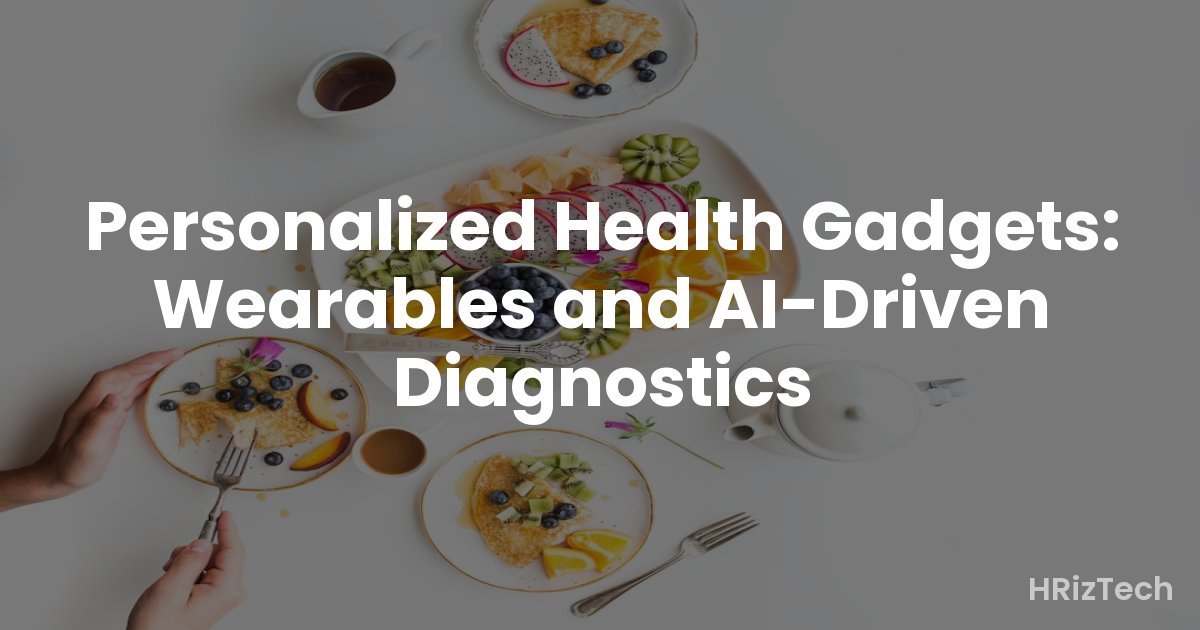Personalized Health Gadgets: Wearables and AI-Driven Diagnostics

Personalized Health Gadgets: Wearables and AI-Driven Diagnostics
- Wearables are becoming increasingly sophisticated, offering personalized health insights.
- AI is revolutionizing diagnostics, allowing for earlier and more accurate detection of health issues.
- Data privacy and security are crucial considerations when using personalized health gadgets.
- The future of healthcare is likely to be heavily reliant on personalized data and AI-driven insights.
The Rise of the Personalized Health Revolution
We're living in a golden age of health technology. Gone are the days of generic health advice; now, thanks to advancements in wearable technology and artificial intelligence (AI), we can access personalized health data and insights like never before. This revolution is driven by a confluence of factors: the miniaturization of sensors, the exponential growth of processing power, and the increasing affordability of sophisticated technology. This means that personalized health gadgets are no longer a futuristic fantasy; they're readily available and increasingly affordable for the average consumer.
Wearable Technology: Your Body's Personal Data Center
Smartwatches, fitness trackers, and even smart clothing are transforming how we monitor our health. These devices go far beyond simply tracking steps and calories. Many now offer continuous heart rate monitoring, sleep analysis, blood oxygen saturation (SpO2) readings, and even ECG capabilities. This data provides a detailed picture of your overall health, allowing you to identify trends and potential issues before they become serious problems. For example, irregular heart rhythms detected by a smartwatch could be an early warning sign of atrial fibrillation, prompting a visit to a doctor for further investigation.
Beyond Fitness Tracking: Advanced Wearable Capabilities
The capabilities of wearable technology are constantly expanding. Some advanced wearables can even monitor stress levels, detect falls, and even track menstrual cycles. This personalized data can be incredibly valuable for managing chronic conditions. For instance, a diabetic patient can use a continuous glucose monitor integrated with their smartwatch to receive real-time alerts about blood sugar levels, allowing for proactive management of their condition and potentially preventing serious complications.
AI-Driven Diagnostics: The Future of Healthcare
Artificial intelligence is playing a crucial role in analyzing the vast amounts of data generated by wearable devices. AI algorithms can identify patterns and anomalies that might be missed by the human eye, providing early warnings of potential health problems. This is particularly important in the detection of chronic diseases, which often develop gradually and without noticeable symptoms in their early stages. AI-powered diagnostics can help detect these subtle changes, enabling earlier interventions and improving treatment outcomes.
AI's Role in Early Disease Detection
Imagine an AI system that analyzes your sleep patterns, heart rate variability, and activity levels to predict the likelihood of developing cardiovascular disease years before any clinical symptoms appear. This is the potential of AI-driven diagnostics. By identifying risk factors early on, individuals can take proactive steps to mitigate those risks and potentially prevent the onset of serious illnesses. This proactive approach has the potential to dramatically change the landscape of healthcare, shifting the focus from treatment to prevention.
Data Privacy and Security: A Critical Consideration
While the benefits of personalized health gadgets are undeniable, it's crucial to address the concerns surrounding data privacy and security. These devices collect highly sensitive personal information, and it's essential to choose reputable brands that prioritize data protection. Read the privacy policies carefully, understand how your data is being used and stored, and ensure that the company has robust security measures in place to prevent unauthorized access or breaches.
Choosing Reputable Brands and Understanding Privacy Policies
Before purchasing any personalized health gadget, research the company's reputation and its commitment to data security. Look for features like data encryption and secure storage, and ensure that the company has a transparent privacy policy that clearly outlines how your data is handled. It's also important to be aware of your rights regarding your data and to understand how you can access, modify, or delete your information.
The Future of Personalized Health
The convergence of wearable technology and AI is poised to revolutionize healthcare, moving us towards a future of personalized, proactive, and preventative care. As technology continues to advance, we can expect even more sophisticated devices and AI algorithms that offer increasingly accurate and insightful health information. This personalized approach has the potential to significantly improve health outcomes, reduce healthcare costs, and empower individuals to take control of their own well-being.
Key Considerations for the Future
While the potential is immense, challenges remain. The accuracy and reliability of AI algorithms need to be continuously improved and validated. Addressing data privacy and security concerns is paramount to building trust and ensuring widespread adoption. And finally, ensuring equitable access to these technologies is crucial for realizing the full potential of personalized healthcare for everyone.
Comments
No comments yet. Be the first to comment!